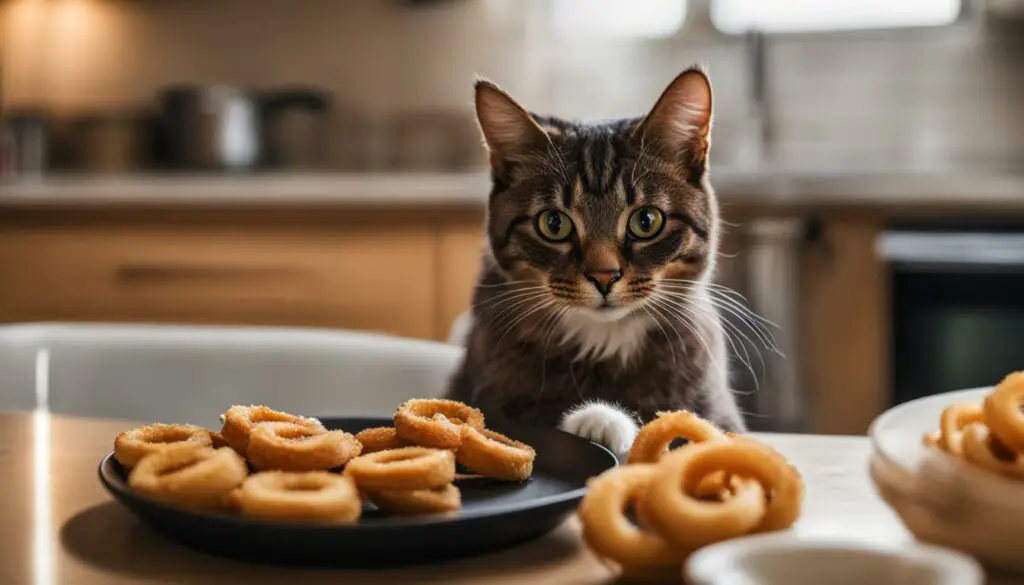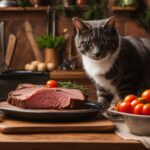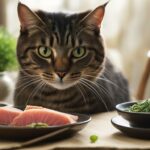As a cat owner, I often wonder about the foods that are safe for my feline friend to consume. One specific question that often pops into my mind is whether cats can have onion rings. In this article, I will dive deep into the topic of feline diets and explore the potential hazards of feeding cats onion rings.
When it comes to feeding our beloved cats, it’s important to remember that their dietary needs are different from ours. While we may enjoy indulging in onion rings as a tasty snack, these delicious treats can be dangerous for our feline companions. Onions, including the ones used to make onion rings, contain sulfur-containing compounds that can be toxic to cats.
Feeding cats onion rings or any food that contains onions can lead to oxidative damage to their red blood cells, causing anemia and other health issues. Therefore, it is crucial to be mindful of the food we offer to our cats and ensure that it is safe for their consumption.
So, the next time you’re enjoying a plate of crispy onion rings, remember to keep them far away from your feline friend. Instead, opt for safe and healthy alternatives, such as plain boiled or grilled chicken, turkey, or fish, which are more suitable for their dietary needs.
Key Takeaways:
- Cats should not be fed onion rings or any food that contains onions due to their high content of sulfur-containing compounds that can be toxic to cats.
- Onions can cause oxidative damage to a cat’s red blood cells, leading to anemia and other health issues.
- It is crucial to be mindful of the food we offer to our cats and ensure that it is safe for their consumption.
- Safe and healthy alternatives for cats include plain boiled or grilled chicken, turkey, or fish.
- Consult with a veterinarian for guidance on a cat’s dietary needs and to ensure their overall well-being.
What are Onion Rings?
Onion rings are a popular bar appetizer and side dish made by slicing onions, dipping them in batter, and frying them until crispy. They are often served with a dipping sauce such as ketchup or ranch dressing. The crispy texture and savory flavor make onion rings a favorite among fried food enthusiasts. Whether enjoyed as a snack or a complement to a burger or sandwich, onion rings are a classic indulgence.
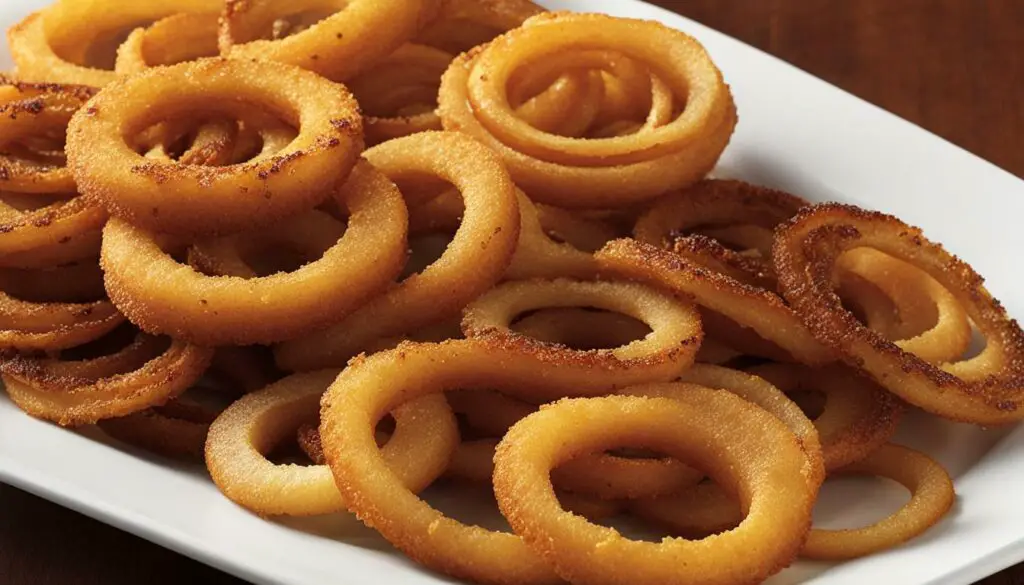
While onion rings may be a tasty treat for humans, they should never be fed to cats. Cats have different dietary needs and cannot safely consume certain foods that humans enjoy. This includes onion rings, which can be harmful to cats due to the presence of onions and other toxic ingredients. As responsible cat owners, it is important to prioritize our pets’ health and avoid feeding them any food that could potentially harm them.
To ensure the well-being of our feline friends, it’s best to stick to cat-friendly treats and avoid sharing our human snacks with them. There are plenty of safe and nutritious alternatives for cats to enjoy, such as plain boiled or grilled chicken, turkey, or fish. By providing our cats with a balanced and appropriate diet, we can help them lead happy and healthy lives.
Can Cats Eat Onion Rings?
Cats should never be fed onion rings or any food that contains onions. Onion rings contain several ingredients that are toxic to cats, including onions, garlic, salt, and baking soda. Onions, in particular, can cause oxidative damage to a cat’s red blood cells, leading to anemia and other serious health issues. Garlic, on the other hand, can cause drooling, vomiting, and liver damage in cats. Salt and baking soda, when consumed in large quantities, can also be harmful to a cat’s health.
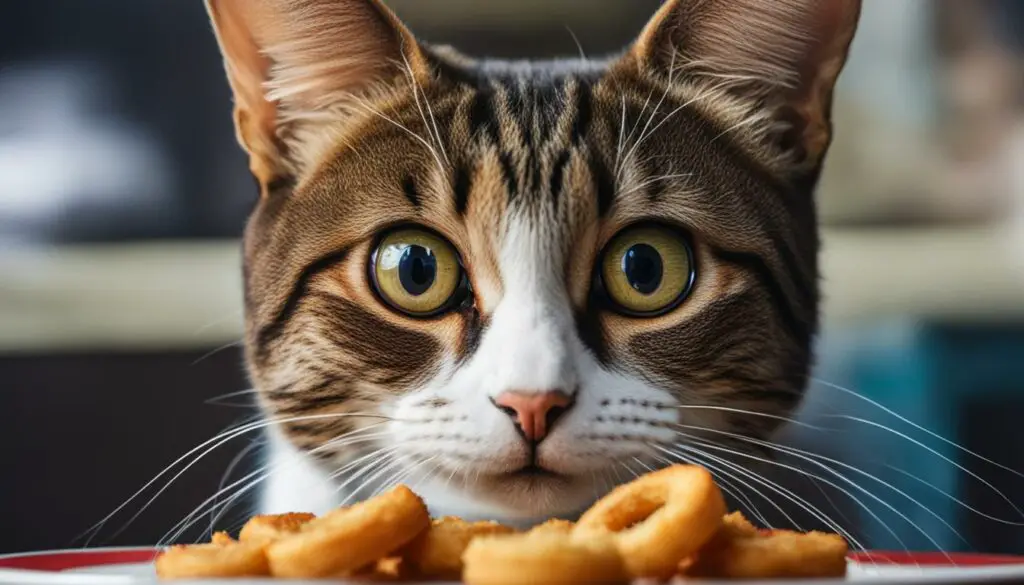
It is important to note that even small amounts of onion or its derivatives can be toxic to cats. As a responsible cat owner, it is crucial to prioritize your cat’s health and well-being by avoiding feeding them any food that contains onions. By doing so, you can help prevent potential health issues and keep your furry friend safe.
If you suspect that your cat has eaten onion rings or any food containing onions, it is recommended to seek immediate veterinary care. The veterinarian can provide the necessary treatment, which may include inducing vomiting to remove the remaining onion from the cat’s stomach and administering supportive care. Prompt intervention is essential to prevent further harm and ensure the best possible outcome for your cat.
What is the Difference Between Fried and Baked Onion Rings?
When it comes to onion rings, one question that often arises is: what is the difference between fried and baked onion rings? The answer lies in the cooking method and the impact it has on the nutrient content of the onions.
Fried onion rings are cooked at a high temperature, typically in oil or a deep fryer. The high heat causes the onions to become crispy on the outside while retaining some moisture on the inside. However, this high-temperature cooking can lead to a loss of some nutrients in the onions. On the other hand, baked onion rings are cooked at a lower temperature in an oven, resulting in a slightly softer texture. The lower temperature helps to preserve more of the nutrients in the onions compared to frying.
Table: Comparison between Fried and Baked Onion Rings
| Aspect | Fried Onion Rings | Baked Onion Rings |
|---|---|---|
| Nutrient Content | Some loss of nutrients due to high-temperature cooking | Retains more nutrients due to lower-temperature cooking |
| Texture | Crispy on the outside, moist on the inside | Slightly softer texture |
It is important to note that while the nutrient content may vary between fried and baked onion rings, both types can still be toxic to cats. The presence of onions in either fried or baked onion rings poses a risk to feline health, as onions contain compounds that can cause oxidative damage to a cat’s red blood cells. Thus, it is crucial to ensure that cats are not fed any food containing onions, regardless of the cooking method.
How Are Onion Rings Toxic to Cats?
Onion rings are toxic to cats primarily because of the sulfur-containing compounds found in onions. These compounds can cause oxidative damage to a cat’s red blood cells, leading to the formation of Heinz bodies and potential anemia. Ingesting onions can also irritate a cat’s gastrointestinal system, causing vomiting, diarrhea, and abdominal pain. It is important to keep onion rings and any food containing onions away from cats to avoid these health issues.
Sulfur-Containing Compounds
The sulfur-containing compounds in onions, such as thiosulfates and disulfides, are the main culprits behind their toxicity to cats. When a cat ingests onions, these compounds can react with the red blood cells and interfere with their normal functioning. This can result in oxidative damage and the formation of Heinz bodies, which are abnormal structures within the cells. Over time, this can lead to anemia and other related health problems.
Oxidative Damage and Anemia
Oxidative damage occurs when there is an imbalance between the production of reactive oxygen species (ROS) and the body’s ability to neutralize them with antioxidants. In the case of onion toxicity in cats, the sulfur-containing compounds in onions contribute to the production of ROS, overwhelming the cat’s antioxidant defenses. This oxidative stress can lead to damage to the red blood cells and the development of anemia.
Gastrointestinal Issues
In addition to the risk of anemia, consuming onion rings can also cause gastrointestinal problems in cats. The irritant effects of onions can lead to inflammation and irritation of the gastrointestinal tract, resulting in symptoms like vomiting, diarrhea, and abdominal pain. These gastrointestinal issues can further worsen a cat’s overall health and well-being.
| Key Points |
|---|
| Onion rings contain sulfur-containing compounds that can cause oxidative damage to a cat’s red blood cells. |
| Ingesting onions can lead to the formation of Heinz bodies and potential anemia in cats. |
| The sulfur-containing compounds in onions can also irritate a cat’s gastrointestinal system, causing vomiting, diarrhea, and abdominal pain. |
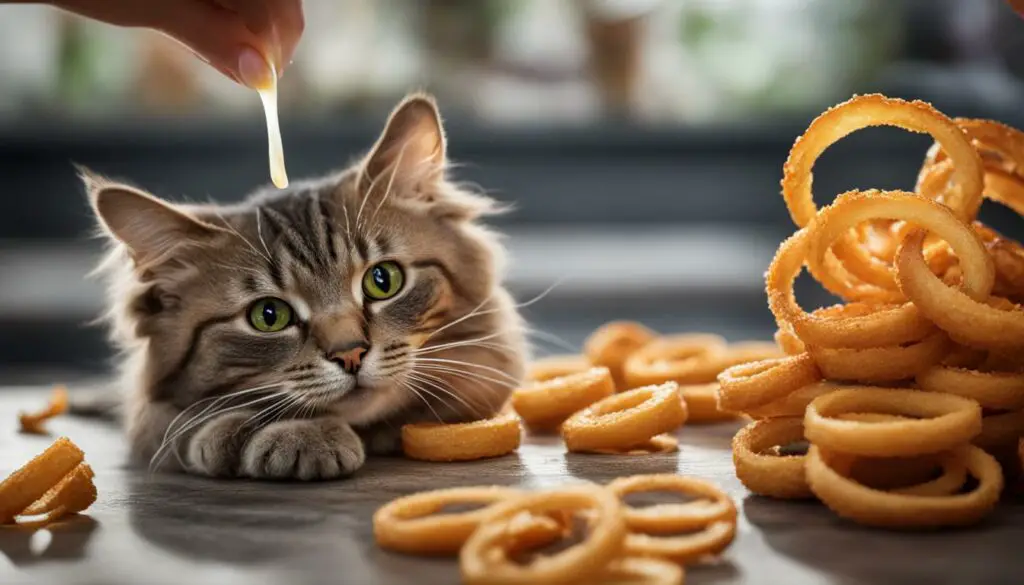
Dangers of Onion for Cats
Cats are highly sensitive to onions and can experience various health dangers if they consume them. The primary risk of onion consumption in cats is the potential for oxidative damage to their red blood cells, which can lead to anemia. Anemia can cause symptoms such as weakness, fatigue, and pale gums. In severe cases, anemia can be life-threatening for cats. Additionally, ingesting onions can also result in gastrointestinal issues, including vomiting, diarrhea, and abdominal pain. If these symptoms are left untreated, they can lead to malnutrition and even kidney failure in cats.
It is important to understand that even small amounts of onion can be harmful to cats. Whether it’s fresh onions, dried onions, or foods containing onion ingredients, all forms of onions should be avoided in a cat’s diet to prevent these health risks. Cats may have individual sensitivities to onion toxicity, so it is crucial to prioritize their safety by avoiding onion consumption altogether.
| Dangers of Onion for Cats | Symptoms | Potential Complications |
|---|---|---|
| Oxidative Damage | Anemia | Kidney Failure |
| Gastrointestinal Issues | Vomiting, Diarrhea, Abdominal Pain | Malnutrition |
If your cat has ingested onion rings or any food containing onions, it is essential to seek immediate veterinary care. The veterinarian may induce vomiting to remove any remaining onion from the cat’s stomach and provide supportive care. Treatment may include intravenous fluids to maintain hydration and address any symptoms or complications caused by onion ingestion. Acting quickly can make a significant difference in the cat’s recovery and overall well-being.
Harmful Onions for Cats: A Comprehensive Guide
The health and well-being of our feline companions are of utmost importance, and it’s crucial to be aware of the potential dangers of certain foods. When it comes to onions, all varieties can be harmful to cats. Whether it’s red onions, white onions, yellow onions, or any other type, the toxic compounds present in onions can have detrimental effects on a cat’s health. This includes onion rings, a popular snack made with onions.
Onions contain sulfur-containing compounds that can cause oxidative damage to a cat’s red blood cells. These compounds can potentially lead to anemia and other related health issues. Even small amounts of onions can be toxic to cats, so it’s best to avoid feeding them any food that contains onions, including onion rings. It’s important to prioritize your cat’s health and well-being by steering clear of onions in their diet.
To emphasize the risks associated with onion consumption for cats, it’s essential to understand the toxic compounds present in onions. This knowledge can help cat owners make informed decisions regarding their pet’s diet. The harmful effects of onions on cats go beyond just anemia. Ingesting onions can also lead to gastrointestinal issues such as vomiting, diarrhea, and abdominal pain. In severe cases, it can even result in malnutrition and kidney failure.
To underline the danger of onions for cats, consider this quote from renowned veterinarian Dr. Jane Phillips, “Onions contain toxic compounds that can cause serious health problems in cats. It’s best to err on the side of caution and avoid feeding them any food that contains onions, including onion rings.”
In summary, all types of onions are harmful to cats, and this includes onion rings. The toxic compounds found in onions can cause oxidative damage to a cat’s red blood cells, leading to various health issues. It’s crucial to prioritize your cat’s health by avoiding onion consumption altogether. Instead, opt for safe and cat-friendly alternatives such as plain boiled or grilled chicken, turkey, or fish. Remember, if your cat has ingested onion rings or any food containing onions, seek immediate veterinary care for the best possible outcome.
| Type of Onion | Toxicity Level |
|---|---|
| Red Onions | High |
| White Onions | High |
| Yellow Onions | High |
| Green Onions | High |
How Much Onion is Too Much for a Cat?
When it comes to feeding onions to cats, even small amounts can be toxic and pose a risk to their health. The severity of the poisoning can vary based on factors such as the cat’s health and age. As a responsible cat owner, it is best to avoid feeding cats any amount of onion to prevent potential health issues. Keep in mind that cats may have individual sensitivities to onion toxicity, so it’s important to prioritize their safety by avoiding onion consumption altogether.
The cumulative effects of onion consumption can be detrimental to a cat’s well-being. The toxic compounds found in onions, such as thiosulfates, can cause oxidative damage to a cat’s red blood cells, leading to anemia and other related health problems. Even a small quantity of onion can potentially result in significant harm. It’s always better to be safe and avoid any risk by not feeding onions to cats.
As a general rule, cats should not be exposed to any form of onion, including onion rings or any food that contains onions. Prevention is key to ensuring the health and well-being of our feline friends. There are plenty of safe and cat-friendly alternatives for treats, such as plain boiled or grilled chicken, turkey, or fish. Always consult with a veterinarian for guidance on a cat’s dietary needs and to ensure their overall well-being.
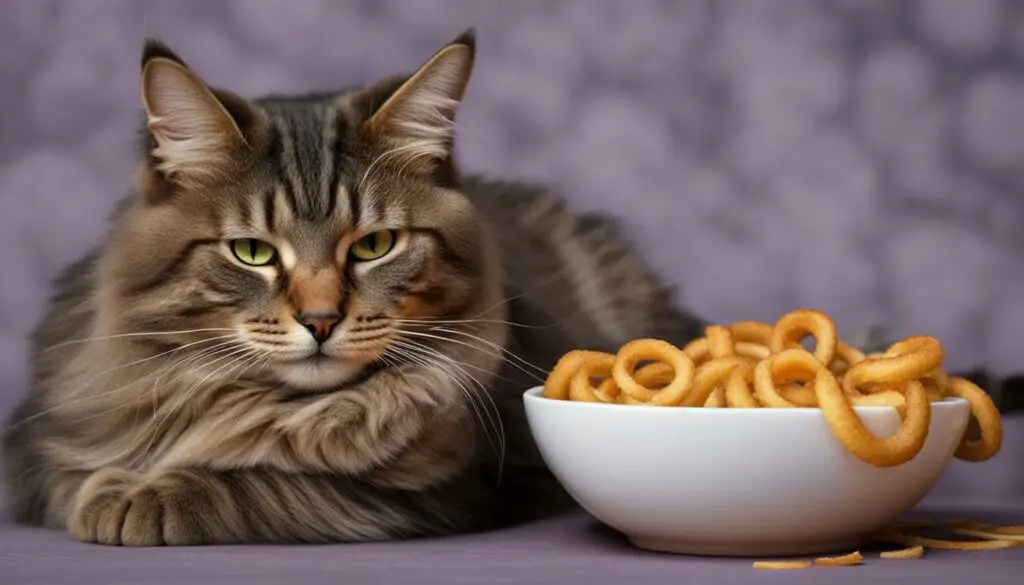
| Table: Onion Consumption and Cat Health | Recommended Action |
|---|---|
| Even small amounts of onion | Should be avoided |
| Cumulative effects of onion consumption | Can be detrimental to a cat’s health |
| Types of onion-containing foods | Onion rings, onion-based dishes |
| Safe alternatives | Plain boiled or grilled chicken, turkey, fish |
It’s important to educate ourselves about the potential risks associated with feeding certain foods to our pets. By being aware of the toxic nature of onions for cats and taking necessary precautions, we can create a safe and healthy environment for our feline companions.
Dried Onion vs. Fresh Onion for Cats
When considering the difference between dried onion and fresh onion for cats, it’s important to note that both forms contain the same toxic compounds that can be harmful to feline health. The drying process does not remove or change the toxic compounds present in onions, making both fresh and dried onions equally dangerous for cats to consume.
Cats are more sensitive to the toxic effects of onions compared to humans and other animals. Even small amounts of these toxic compounds can lead to oxidative damage to a cat’s red blood cells, potentially resulting in anemia and other health complications. It is crucial to keep all forms of onions, including dried onions, away from cats to protect their well-being.
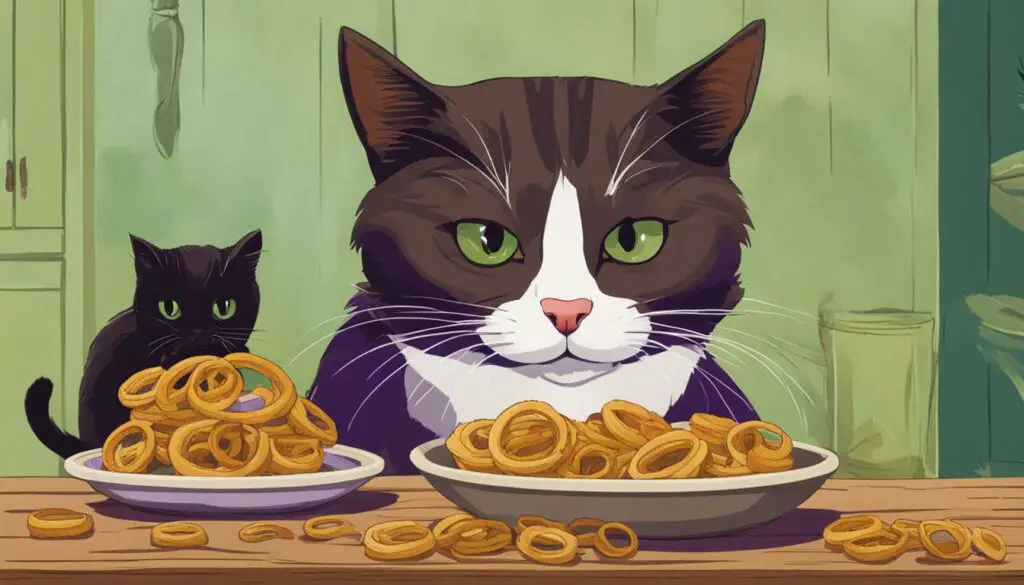
What to Do if Your Cat Has Eaten Onion Rings
If your cat has eaten onion rings or any food containing onions, it is crucial to seek immediate veterinary care. Time is of the essence in these situations to prevent further harm to your cat’s health. Here are the steps you should take:
- Contact your veterinarian: Call your veterinarian’s office right away and inform them about the situation. They will provide you with guidance on what to do next.
- Follow their instructions: Your veterinarian may advise you to induce vomiting in your cat to remove any remaining onion from their stomach. They will provide you with the appropriate method and dosage to do this safely.
- Seek supportive care: After inducing vomiting, your veterinarian may recommend bringing your cat in for further examination and supportive care. This may include administering activated charcoal to bind any remaining toxins, providing intravenous fluids to maintain hydration, and monitoring your cat’s condition closely.
Remember, it is crucial to act quickly and seek professional help when your cat has ingested onion rings or any food containing onions. The veterinarian will be able to assess the severity of the situation and provide the necessary treatment to ensure your cat’s well-being.

Seek immediate veterinary care if your cat has eaten onion rings. Do not try to induce vomiting or administer any home remedies without consulting a professional. Your cat’s health is of utmost importance, and the veterinarian will be able to provide the necessary care and guidance.
Can Cats Safely Consume Onions?
When it comes to cats consuming onions, it is important to recognize the potential dangers. Onions contain compounds called thiosulfates, which can be toxic to cats and lead to onion poisoning. These compounds have the ability to cause oxidative damage to a cat’s red blood cells, resulting in various health issues. To ensure the well-being of our feline friends, it is essential for cat owners to be aware of the risks and prevent their cats from consuming onions in any form.
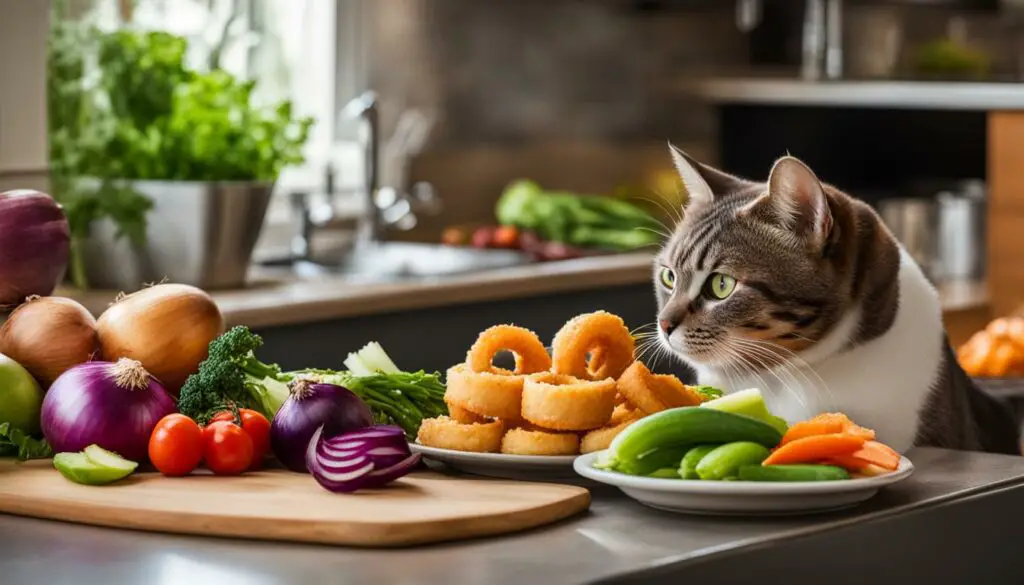
In order to protect our cats, it is best to avoid feeding them onion rings or any other food that contains onions. Even small amounts of onions can be harmful, and the severity of the poisoning can vary based on individual sensitivities. It is important to remember that prevention is key when it comes to onion toxicity in cats.
There are plenty of safe and healthy alternatives for cats to enjoy. Plain boiled or grilled chicken, turkey, or fish can make delicious and cat-friendly options. It is always recommended to consult with a veterinarian to ensure that your cat’s dietary needs are met and their overall well-being is prioritized.
Understanding the Risks of Onion Consumption for Cats
Cats are beloved pets that bring joy and companionship to our lives. As cat owners, it is our responsibility to ensure their health and well-being. When it comes to their diet, it’s important to be aware of potential risks associated with certain foods. One food that poses a significant danger to cats is onions. Onions contain thiosulfates, which can cause oxidative damage to a cat’s red blood cells. This can lead to a condition known as Heinz body anemia, which can have serious consequences for their health.
Thiosulfates are toxic compounds that can accumulate in a cat’s body over time, leading to the destruction of red blood cells. The oxidative damage caused by thiosulfates can cause weakness, lethargy, and other related health problems. It is important to recognize the risks of onion consumption for cats and take necessary precautions to keep them safe.
Heinz Body Anemia: A Serious Consequence
Heinz body anemia is a condition that can occur in cats as a result of onion toxicity. It is characterized by the formation of abnormal structures in the red blood cells, known as Heinz bodies. These structures can cause the red blood cells to become fragile and break down, leading to anemia. Symptoms of Heinz body anemia in cats may include fatigue, weakness, pale gums, and increased heart rate.
To protect our feline companions from the risks of onion consumption, it is crucial to avoid feeding them any food that contains onions. This includes not only onion rings but also other dishes or ingredients that may contain onions. By prioritizing their health and well-being, we can ensure that our cats live long, happy lives free from the dangers of onion toxicity.
| Risks of Onion Consumption for Cats |
|---|
| Thiosulfates: Toxic compounds found in onions that can cause oxidative damage to a cat’s red blood cells. |
| Oxidative Damage: The destruction of red blood cells due to the accumulation of thiosulfates, leading to anemia. |
| Heinz Body Anemia: A serious consequence of onion toxicity, characterized by the formation of abnormal structures in red blood cells. |
Symptoms of Onion Poisoning in Cats
Onion poisoning in cats can lead to various symptoms that cat owners should be aware of. If a cat has ingested onions, whether in the form of onion rings or other foods containing onions, it is important to watch for signs of onion poisoning. Some common symptoms include:
- Vomiting
- Diarrhea
- Loss of appetite
- Pale gums
- Increased heart rate
If a cat displays any of these symptoms and there is a possibility of onion ingestion, it is crucial to seek immediate veterinary care. Prompt intervention can make a significant difference in the cat’s recovery. The veterinarian will be able to assess the cat’s condition and provide appropriate treatment.
It’s important to note that these symptoms may vary in severity depending on the amount of onion consumed and the individual cat’s sensitivity to the toxic compounds found in onions. Cats may show different reactions to onion poisoning, so it’s essential to be vigilant and monitor their health closely.
Please refer to the table below for a quick summary of the symptoms of onion poisoning in cats:
| Symptoms of Onion Poisoning in Cats |
|---|
| Vomiting |
| Diarrhea |
| Loss of appetite |
| Pale gums |
| Increased heart rate |
Remember, if you suspect that your cat has ingested onions or is showing any of these symptoms, contact your veterinarian immediately for guidance and treatment.

Onion and Cats: Determining Safe Consumption Levels
When it comes to onions and cats, it is crucial to understand that there is no safe level of consumption for these two to mix. Even small quantities of onions can be harmful to cats, and the severity of the poisoning can vary based on individual sensitivities. Therefore, it is always best to err on the side of caution and avoid feeding cats any food that contains onions.
Onions contain compounds called thiosulfates, which can cause oxidative damage to a cat’s red blood cells and result in various health issues. These health issues can range from anemia to gastrointestinal problems, and in severe cases, they can even lead to malnutrition and kidney failure. To prioritize the health and well-being of our feline friends, it is essential to keep onions far away from their diet.
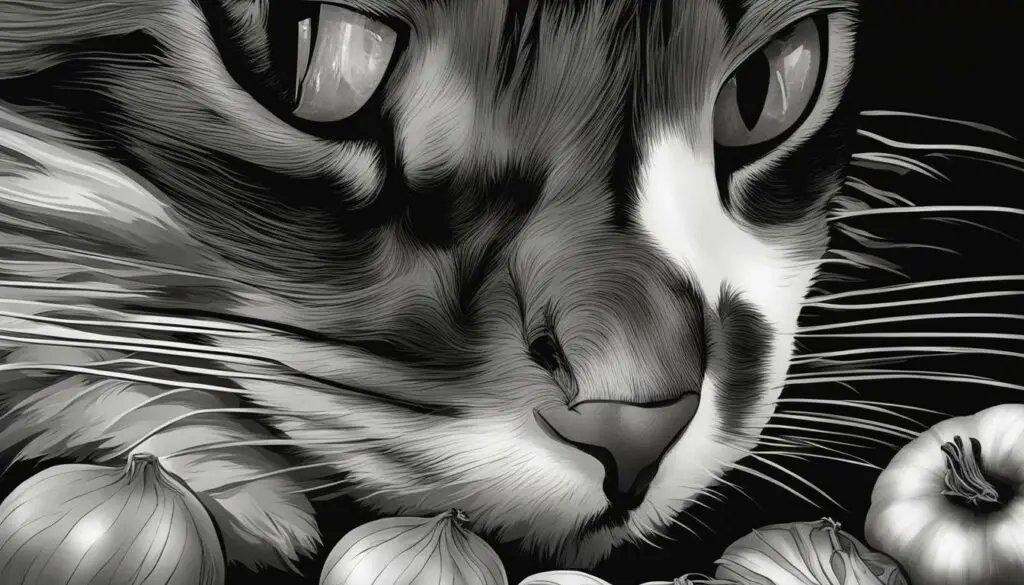
As responsible cat owners, we must remember that prevention is key to protecting our cats from onion toxicity. Instead of onions, there are plenty of safe and healthy alternatives for cats to enjoy. For example, plain boiled or grilled chicken, turkey, or fish are excellent options that provide essential nutrients without posing any harm to our furry companions. If you have any concerns about your cat’s diet or health, always consult with a veterinarian for professional guidance and to ensure their overall well-being.
Commercial Cat Food and Onion Usage: What You Need to Know
When it comes to choosing the right commercial cat food for your furry friend, it is essential to review the ingredient list carefully to ensure there are no onions or onion-derived ingredients. Onions should be avoided in cat food, as even small amounts can be toxic to cats. While commercial cat food brands prioritize the nutritional needs of cats, it’s always important to double-check the ingredient list to ensure your cat’s safety and well-being.
Onions can hide in various forms in cat food, such as onion powder, dehydrated onion, or onion flavoring. These ingredients can be harmful to cats, as they contain the same toxic compounds found in fresh onions. Consumption of such ingredients can lead to oxidative damage to a cat’s red blood cells and potential health issues, including anemia and gastrointestinal problems.
It’s also essential to be mindful of potential sources of onions in a cat’s environment, such as garbage bins or compost piles. Cats are curious creatures, and they may come across onion scraps accidentally, increasing the risk of onion toxicity. Taking precautions to secure these potential sources and properly disposing of onion scraps can help safeguard your cat’s well-being.
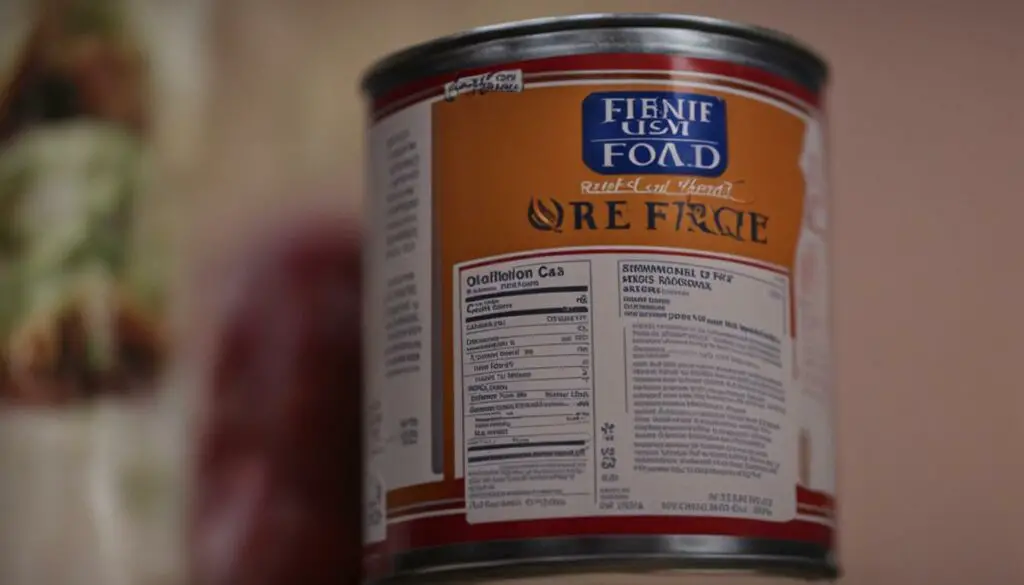
Conclusion
In conclusion, it is crucial to prioritize the health of our feline friends and avoid feeding them onion rings or any food that contains onions. Onions can be highly toxic to cats, causing oxidative damage to their red blood cells and leading to anemia and gastrointestinal issues. Therefore, it is best to err on the side of caution and keep onions away from cats.
Fortunately, there are plenty of safe and cat-friendly alternatives that can be offered to our furry companions. Plain boiled or grilled chicken, turkey, or fish are excellent options that can provide a healthy and enjoyable meal for cats. These alternatives are not only safe but also offer essential nutrients that contribute to their overall well-being.
Remember, when it comes to our beloved cats, it’s always better to be safe than sorry. If you suspect that your cat has ingested onion rings or any food containing onions, it is essential to seek immediate veterinary care. Early intervention can make a significant difference in their recovery and prevent further harm to their health.
By being mindful of the potential dangers of onions and making informed choices about our cats’ diets, we can ensure that they lead long and healthy lives. Let’s prioritize their health and happiness by avoiding onions and providing them with safe and delicious alternatives.
FAQ
Can cats have onion rings?
No, cats should not eat onion rings or any food that contains onions due to their toxicity to cats.
What are onion rings?
Onion rings are a popular bar appetizer made by slicing onions, dipping them in batter, and frying them until crispy. They are often served with a dipping sauce such as ketchup or ranch dressing and can also be used as a side dish for burgers and sandwiches.
Can cats eat onion rings?
No, cats should not consume onion rings or any food that contains onions. Onion rings contain multiple ingredients that are toxic to cats, including onions, garlic, salt, and baking soda.
What is the difference between fried and baked onion rings?
Fried onion rings are cooked at a high temperature, which can destroy some of the nutrients in the onions. Baked onion rings are cooked at a lower temperature, preserving more nutrients. However, both types of onion rings can still be toxic to cats due to the presence of onions and other harmful ingredients.
How are onion rings toxic to cats?
Onion rings are toxic to cats primarily because of the sulfur-containing compounds found in onions. These compounds can cause oxidative damage to a cat’s red blood cells, leading to the formation of Heinz bodies and potential anemia. Ingesting onions can also irritate a cat’s gastrointestinal system, causing vomiting, diarrhea, and abdominal pain.
What are the dangers of onion for cats?
The primary danger of onions for cats is the potential for oxidative damage to their red blood cells, leading to anemia. Anemia can make cats feel weak, lethargic, and can even be fatal in severe cases. Ingesting onions can also cause gastrointestinal issues in cats, such as vomiting, diarrhea, and abdominal pain.
What types of onions are harmful to cats?
All types of onions are harmful to cats. Whether it’s red onions, white onions, yellow onions, or any other variety, the toxic compounds in onions can cause oxidative damage to a cat’s red blood cells, leading to health issues.
How much onion is too much for a cat?
Even small amounts of onion can be harmful to cats. The severity of the poisoning depends on factors such as the health and age of the cat. As a general rule, it is best to avoid feeding cats any amount of onion to prevent potential health issues.
Is dried onion different from fresh onion for cats?
Both dried onions and fresh onions contain the same toxic compounds that can be harmful to cats. The drying process does not remove or change the toxic compounds in onions. Whether the onion is fresh or dried, it should be avoided in a cat’s diet.
What should I do if my cat has eaten onion rings?
If your cat has eaten onion rings or any food containing onions, it is important to seek immediate veterinary care. The veterinarian may induce vomiting to remove the remaining onion from the cat’s stomach and administer supportive care.
Can cats safely consume onions?
No, cats should not consume onions or foods that contain onions. Onions contain compounds called thiosulfates, which can be toxic to cats and lead to onion poisoning.
What are the risks of onion consumption for cats?
The risks of onion consumption for cats include the potential for thiosulfates to cause oxidative damage, resulting in Heinz body anemia and related health issues.
How can I recognize the symptoms of onion poisoning in cats?
Symptoms of onion poisoning in cats can include vomiting, diarrhea, loss of appetite, pale gums, and increased heart rate. If a cat shows any of these symptoms and has potentially ingested onions, immediate veterinary attention should be sought.
What is the safe consumption level of onion for cats?
There is no safe level of onion consumption for cats. Even small quantities can be harmful, and the severity of the poisoning can vary based on individual sensitivities. It is always best to avoid feeding cats any food that contains onions.
What should I know about commercial cat food and onion usage?
When purchasing commercial cat food, it is important to review the ingredient list carefully to ensure there are no onions or onion-derived ingredients. Onions should be avoided in cat food, as even small amounts can be toxic to cats.
Can cats safely consume onions?
No, cats should not consume onions or foods that contain onions. Onions contain compounds called thiosulfates, which can be toxic to cats and lead to onion poisoning.

